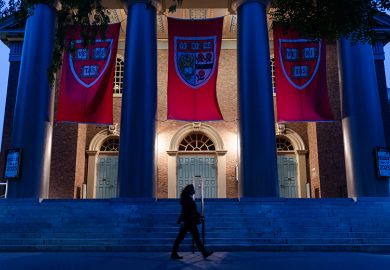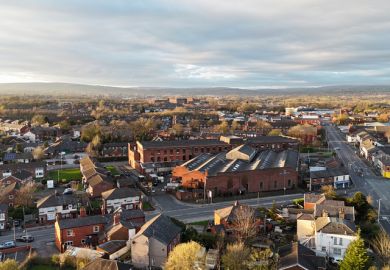Theresa May “probably hopes” that London Metropolitan University will “go under”, but the institution is “not going to be the Northern Rock of the HE sector” and its undervalued social mission is irreplaceable, says its vice-chancellor.
Lynn Dobbs told Times Higher Education that there “has to be” a place for London Met in an increasingly marketised and competitive sector. The institution prioritises its social mission in Islington, the north London borough that surrounds its Holloway Road campus, with 70 per cent of its students coming from the highest two deciles on the indices of multiple deprivation.
“Without London Metropolitan University and a small number of universities like us across the country there is no potential for social change,” said Professor Dobbs, who took over from John Raftery in October 2018 after serving as deputy vice-chancellor at the University of Roehampton. “It has to work. And that is the reason I wanted the job.”
However, Professor Dobbs warned that the combination of the government’s post-18 education funding review – expected to cut tuition fees and university funding – and Brexit “could potentially be catastrophic for a number of universities”.
“I think Theresa May doesn’t like London Met and probably hopes that London Met would go under – I’m putting words into her mouth there,” Professor Dobbs continued.
Mrs May was home secretary at the time of the Home Office’s dramatic 2012 decision to withdraw London Met’s licence to sponsor overseas students. But Professor Dobbs also cited government-enforced metrics like the teaching excellence framework, which she said placed London Met “in a particular position”. Universities that focus on widening participation have complained that they are disadvantaged by the assessment’s focus on graduate employment.
A “number of politicians probably think it’s going to be London Met that goes under”, Professor Dobbs said. But she added: “We are not going to be the Northern Rock of the HE sector…Although we’ve got ongoing operating deficits, we have enough money in the bank to weather a storm.”
Professor Dobbs, a former director of Northumbria University’s Centre for Public Policy, whose research focused on tackling social exclusion, said that if London Met did not exist “some of the students who come from directly around the university wouldn’t travel to another university”. They would then miss out on “transformation” in their lives, which could also have an impact on their “wider life in their communities and on their families”, she argued.
Professor Dobbs said that her own background in Newcastle – she left school at 16 and entered university without A levels in her early thirties after having children – informed her leadership of London Met. She studied politics because the timetabling of the course allowed her to juggle study with childcare.
At London Met, she is “championing the idea that first-years at the very least should have two days when they don’t study, to allow them to work and travel. And they shouldn’t start before 10 o’clock, so they can drop their kids off at school.”
But there are major challenges at London Met: a huge drop in student recruitment since the abolition of number controls – London pre-92 universities “have sucked all the numbers out of the post-92 sector”, said Professor Dobbs – and a deficit of £20 million in the latest accounts.
The university has rationalised its estate, bringing everything on to the Holloway Road campus, barring the Sir John Cass School of Art, Architecture and Design which will remain in Aldgate, a recognition of its impact for the creative industries in the area and the borough of Tower Hamlets more widely.
The university is “still dealing with one-off costs and some of the legacy of previous restructuring”, Professor Dobbs argued. The deficit is “mostly one-off costs, but I would also say [addressing it is] about getting our staff base and our cost base to fit the size of the university now”, with a plan to achieve a surplus in three years.
“Diversifying income” is one key aim, she said. This involves turning more overseas student applications – there were 3,500 last year – into actual recruitment.
Professor Dobbs is also working on a programme to enhance the university’s civic impact, and has had an “amazing response” from meetings with organisations including Islington Council, the Metropolitan Police and Arsenal Football Club.
She said the university can “make a real difference to the social issues facing London” by tying its work “into the priorities of the partners” – which could involve aspects such as London Met’s research on gun and knife crime, or its training for social workers and teachers.
London Met has a “bloody good estate, it’s got a fantastic science centre, the teaching facilities are good, the Cass is phenomenal, the cybersecurity research centre is off the map in terms of being fantastic,” Professor Dobbs said. “It’s absolutely great, unexpectedly great. It’s a hidden gem.”
john.morgan@timeshighereducation.com
Academics and university leaders will discuss how universities play an effective role in supporting civic efforts to create a more inclusive society at Times Higher Education’s Teaching Excellence Summit, which is taking place at Western University, in London, Ontario, Canada, from 4-6 June 2019.
POSTSCRIPT:
Print headline: ‘We will not be the Northern Rock of HE’
Register to continue
Why register?
- Registration is free and only takes a moment
- Once registered, you can read 3 articles a month
- Sign up for our newsletter
Subscribe
Or subscribe for unlimited access to:
- Unlimited access to news, views, insights & reviews
- Digital editions
- Digital access to THE’s university and college rankings analysis
Already registered or a current subscriber?








